
In today's complex healthcare landscape, the role of a virtual chief information officer (CIO) is paramount in boosting efficiency and enhancing cybersecurity. With tailored IT solutions, a virtual CIO not only enhances compliance but also optimizes budgets and strengthens cybersecurity measures. The integration of advanced technologies and strategic planning is crucial; it enables medical organizations to minimize operational costs while safeguarding patient information. This strategic approach is essential for improving overall service delivery, addressing the unique challenges that healthcare organizations face in an increasingly digital world.
As cybersecurity threats continue to evolve, healthcare organizations must remain vigilant. The implications of these threats are significant, affecting not just compliance but also the trust patients place in medical institutions. By leveraging the expertise of a virtual CIO, organizations can effectively navigate these challenges, ensuring that they are not only compliant but also resilient against potential breaches. This proactive stance is vital for maintaining the integrity of patient data and the overall quality of care provided.
In conclusion, the partnership with a virtual CIO represents a strategic investment in the future of healthcare. By focusing on cybersecurity, compliance, and operational efficiency, medical organizations can enhance their service delivery and build a more secure environment for patient care. The time to act is now; integrating a virtual CIO into your strategy could be the key to thriving in today's healthcare landscape.
In an era where healthcare organizations are increasingly besieged by regulatory demands and cybersecurity threats, the emergence of the virtual chief information officer (CIO) stands as a pivotal development. This role not only delivers customized IT solutions that enhance operational efficiency but also fortifies compliance with rigorous regulations such as HIPAA.
As medical entities endeavor to elevate patient care while navigating an intricate IT landscape, a pressing question arises: how can a virtual CIO effectively revolutionize healthcare operations and protect vital patient data in this swiftly changing environment?
Cyber Solutions Inc. recognizes the critical importance of cybersecurity in healthcare and provides specialized virtual chief information officer services that cater specifically to the unique needs of medical organizations. These services encompass:
This enables medical providers to focus on delivering quality patient care while Cyber Solutions expertly navigates their IT complexities. By addressing the distinct regulatory and operational challenges faced by the medical sector, Cyber Solutions customizes its approach to maximize value and efficiency.
As we look ahead to 2025, the role of the virtual chief information officer will become increasingly vital as the medical field transitions toward a more personalized and technology-driven model. With the integration of , medical entities will rely more heavily on customized IT strategies to enhance operational efficiency and improve patient outcomes. The implementation of managed IT services streamlines workflows and ensures compliance with stringent regulations, ultimately reducing the risk of costly data breaches.
Cyber Solutions provides comprehensive HIPAA compliance solutions, integrating robust cybersecurity measures such as:
These measures safeguard patient health information (PHI) from unauthorized access and breaches. Our proactive risk management strategies identify and address vulnerabilities, while our audit support ensures that institutions remain audit-ready with thorough documentation and expert guidance. Industry leaders emphasize the necessity of tailored IT solutions in the medical field. As the landscape shifts toward digital hospitals and precision medicine, the demand for strategic oversight in IT management will only intensify. For example, a recent case study demonstrated that a digital hospital leveraging AI and automation significantly improved efficiency and patient care, further underscoring the importance of managed IT services. Cyber Solutions leads this transformation, equipping medical institutions with the knowledge required to thrive in an increasingly complex environment.

In today's digital landscape, a virtual chief information officer (CIO) is indispensable for medical entities striving to navigate the complexities of strict industry regulations, such as HIPAA and GDPR. By establishing comprehensive compliance frameworks and conducting regular audits, a CIO significantly mitigates the risks associated with data breaches and regulatory penalties. Our HIPAA compliance services are fortified by robust cybersecurity strategies, incorporating advanced encryption, multi-factor authentication, and stringent access control measures. This ensures that medical entities not only meet but exceed the highest standards of data protection.
Consider the impact: medical entities that have adopted remote CIO services report a remarkable enhancement in their compliance posture, with some achieving a 50% reduction in audit expenses and efforts. This proactive approach includes ongoing monitoring, expert guidance, and tailored solutions that , while simultaneously bolstering the entity's reputation and fostering trust among patients. As the landscape of medical data privacy evolves, the role of a remote CIO becomes increasingly vital in managing the complexities of compliance, ensuring that entities remain resilient against the escalating tide of cyber threats and regulatory scrutiny.
Adhering to these regulations transcends mere legal obligation; it is a fundamental aspect of preserving patient trust and upholding organizational integrity. The question is, can your organization afford to overlook this critical component of healthcare management?
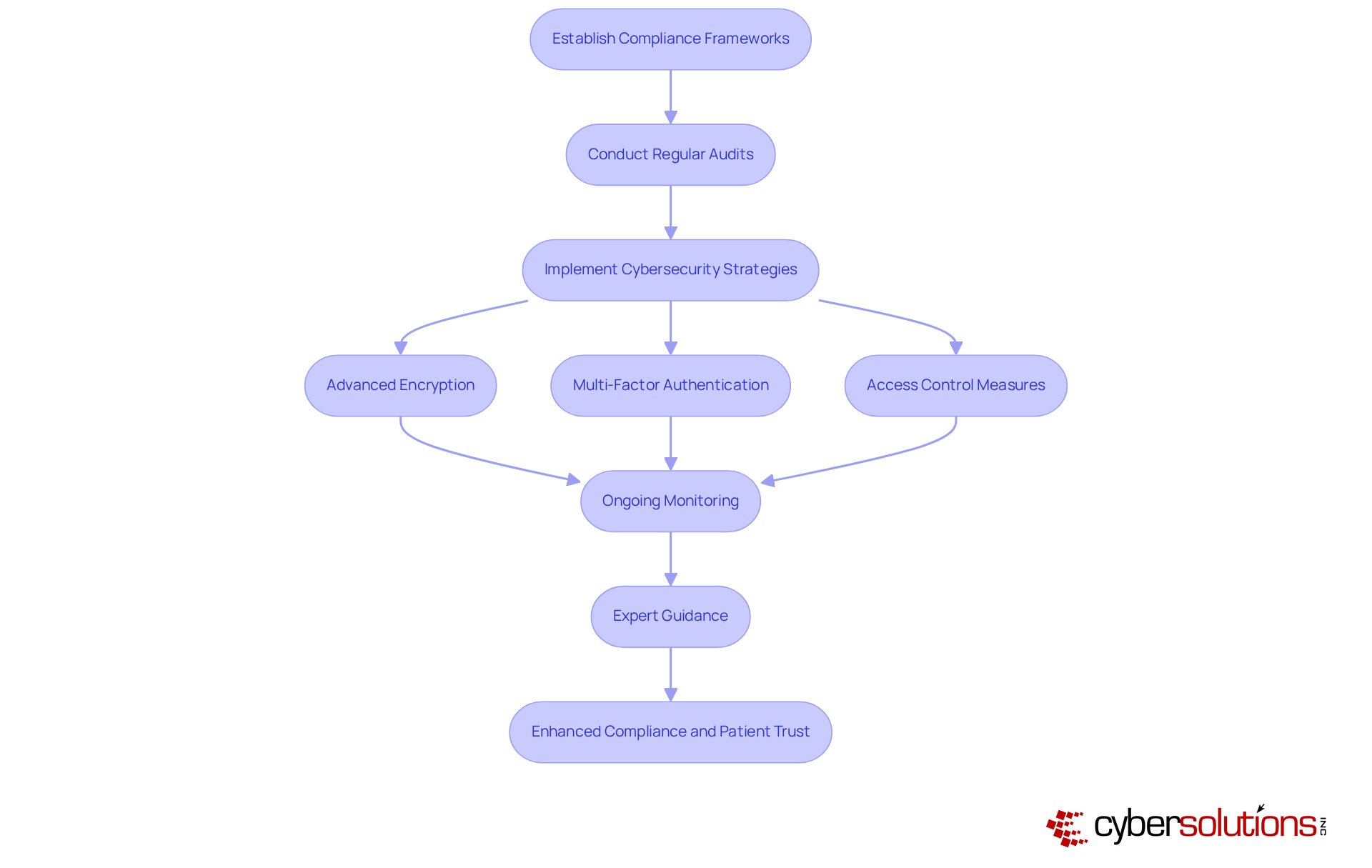
The virtual chief information officer plays a pivotal role in enhancing cost efficiency by optimizing IT budgets through strategic planning and resource allocation. By identifying excessive costs and leveraging cloud solutions, a Chief Information Officer ensures that medical institutions maximize their IT investments. This approach not only but also facilitates reinvestment in critical areas such as patient care and technology upgrades, ultimately strengthening the organization's overall effectiveness.
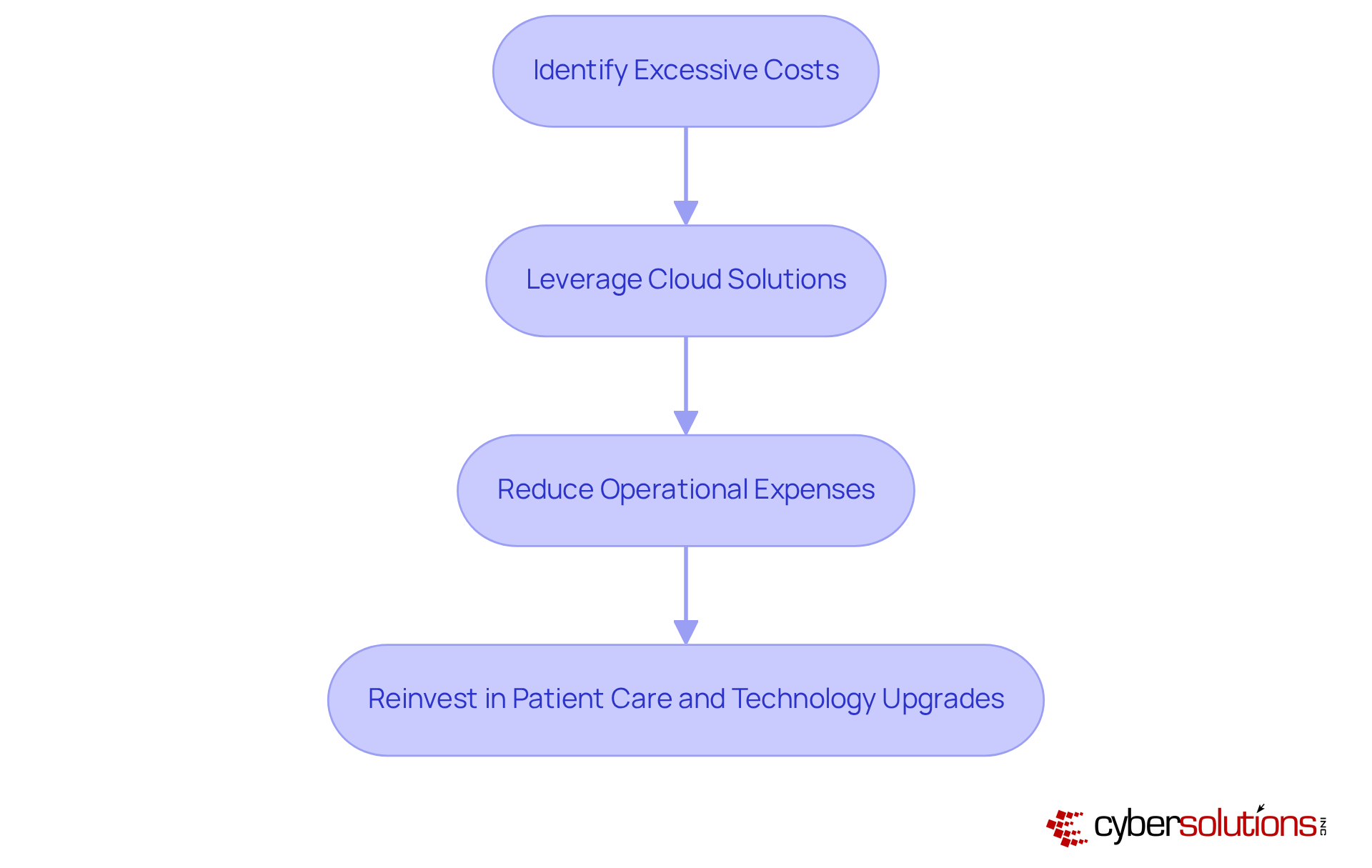
In today's landscape, the growing threat of cyberattacks underscores the critical need for enhanced cybersecurity strategies within medical institutions. The role of a virtual chief information officer is essential in this endeavor, as they implement advanced security protocols and conduct regular vulnerability assessments. Furthermore, they ensure that all staff are well-trained in cybersecurity best practices. This comprehensive approach not only safeguards sensitive patient data but also significantly minimizes the risk of costly data breaches.
By integrating robust cybersecurity measures—such as encryption and multi-factor authentication—a virtual chief information officer empowers organizations to effectively meet HIPAA compliance requirements. Their expertise in proactive risk management, incident response strategies, and ongoing compliance efforts enables healthcare providers to swiftly address potential threats and maintain audit readiness. This, in turn, enhances , ensuring that institutions are well-prepared to face the evolving challenges of the digital age.

In today's healthcare landscape, the significance of cybersecurity cannot be overstated. A virtual chief information officer enhances operational efficiency by streamlining IT processes and ensuring technology aligns with organizational goals. By implementing best practices in IT management, they assist medical organizations in minimizing downtime, enhancing service delivery, and improving patient experiences. This operational focus enables medical providers to allocate more resources to patient care and innovation.
With the growing threat of cyberattacks, a Chief Information Officer plays a crucial role in integrating comprehensive , ensuring that patient health information (PHI) is safeguarded through robust cybersecurity measures. This includes proactive risk management strategies, such as continuous monitoring and incident response planning, which are essential for maintaining compliance and minimizing operational disruptions. For instance, in a recent ransomware attack case, rapid response and effective incident management were critical in safeguarding patient data and ensuring compliance.
By utilizing virtual CISO services, healthcare entities can gain from expert guidance and oversight, ensuring that their cybersecurity strategies are effective and aligned with HIPAA requirements. Furthermore, the Remote CIO can assist with reporting and audit support, aiding entities in remaining audit-ready and adhering to HIPAA standards. This comprehensive approach not only boosts cybersecurity confidence but also protects the entity's reputation and operational integrity.
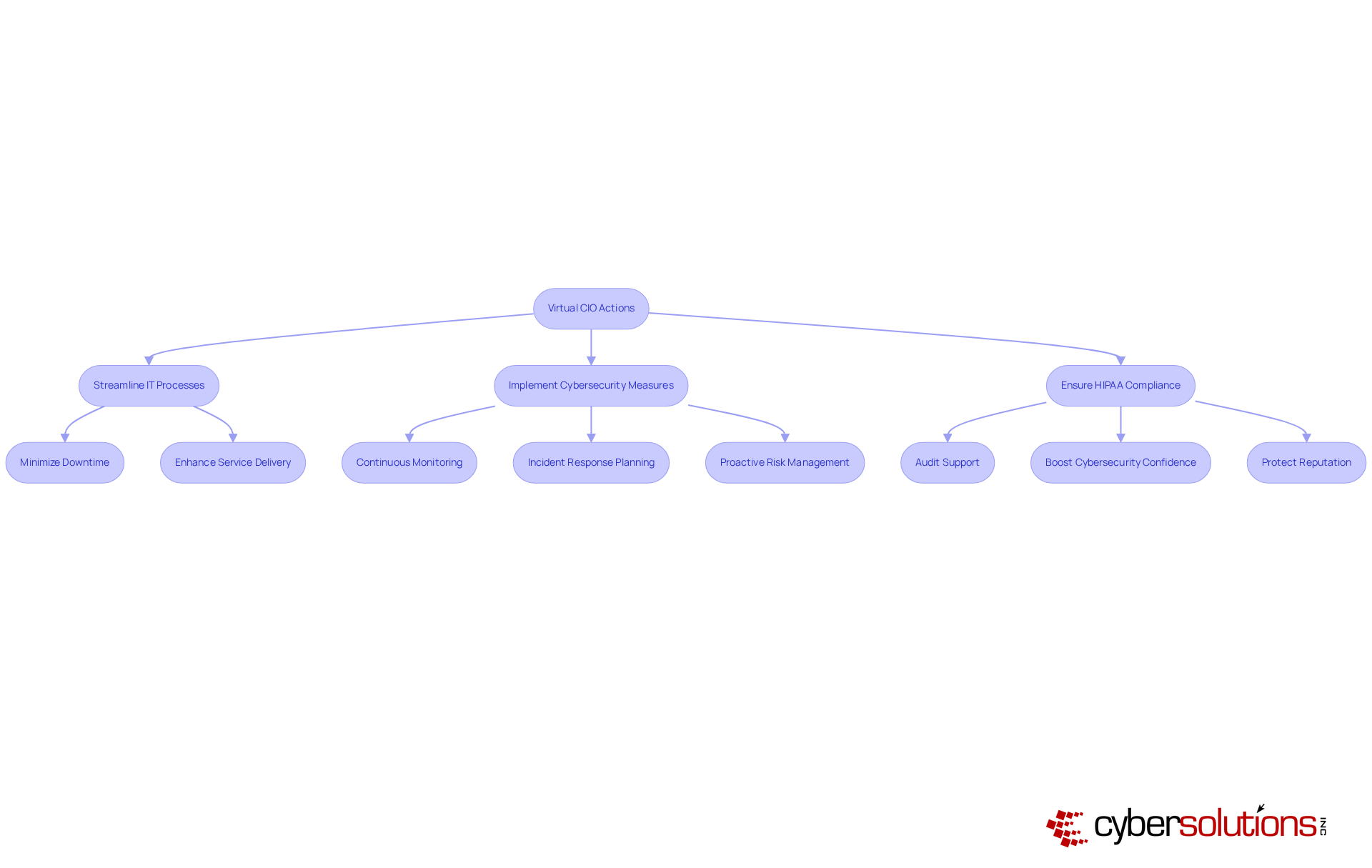
In the ever-evolving landscape of healthcare, a Remote CIO is essential for strategic IT planning. This role empowers medical entities to anticipate future challenges and seize opportunities, all while ensuring rigorous . By closely analyzing industry trends and technological advancements, they craft long-term IT strategies that not only align with organizational goals but also integrate robust cybersecurity measures. Such foresight is critical in safeguarding patient health information (PHI) and enabling medical providers to remain competitive and responsive to the shifting demands of patients and regulatory frameworks.
Moreover, through proactive risk management and expert guidance, a Chief Information Officer significantly enhances cybersecurity confidence. They prepare healthcare entities for potential incidents and ensure they are audit-ready at all times. This comprehensive approach to cybersecurity not only protects sensitive data but also fosters a culture of compliance and readiness, ultimately benefiting both the organization and its patients. As the healthcare sector continues to face increasing cybersecurity threats, the role of a Remote CIO becomes not just advantageous but vital for sustaining operational integrity and trust.
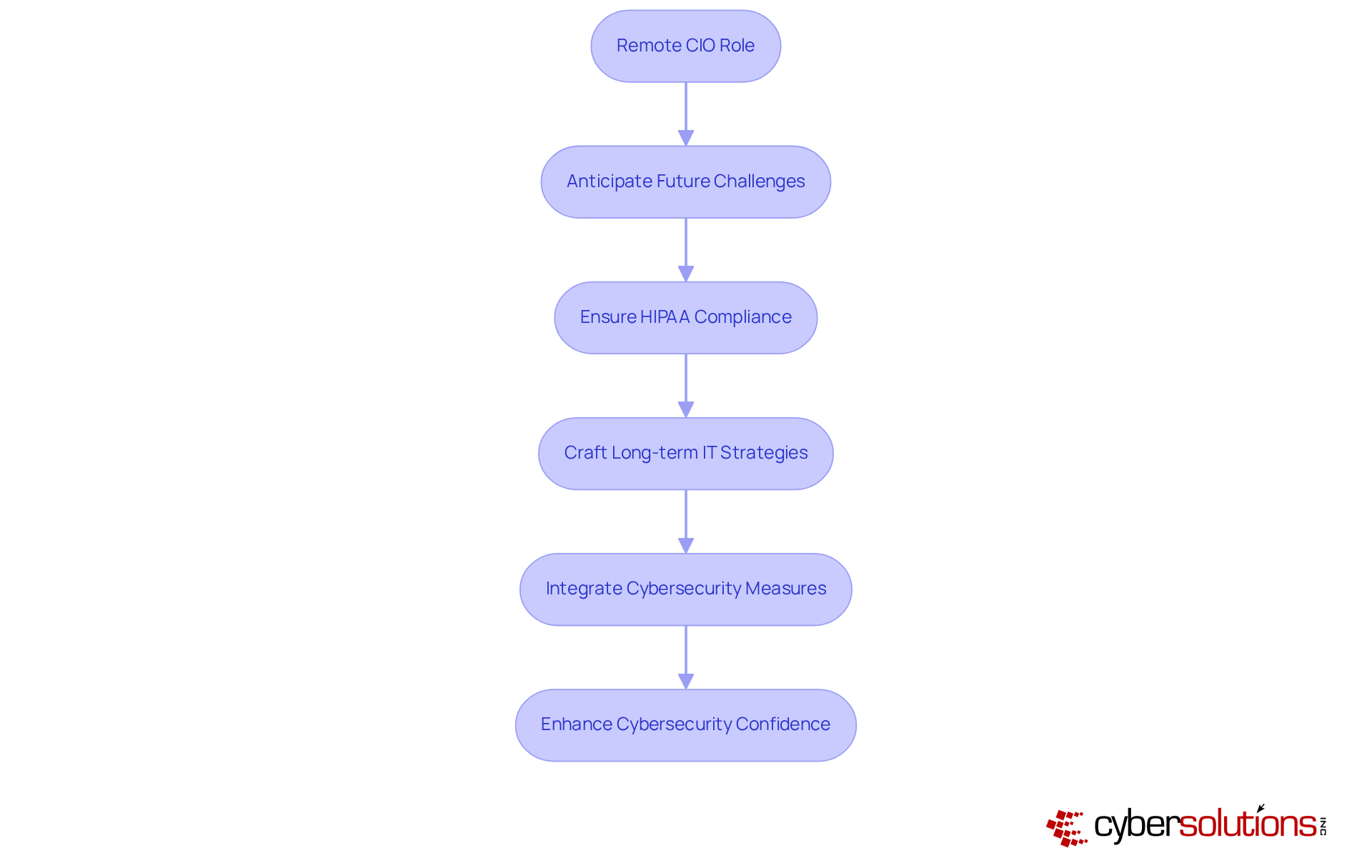
In today's healthcare landscape, cybersecurity is not just an option; it is a necessity. A virtual chief information officer offers tailored IT solutions that meet the distinct requirements of each medical entity, especially in terms of HIPAA compliance and cybersecurity. By conducting thorough assessments of existing IT infrastructure and understanding specific operational challenges, they develop customized strategies that enhance both efficiency and security. This approach ensures that medical service providers receive the most relevant and effective IT support, integrating robust cybersecurity measures such as:
With an emphasis on , audit assistance, and the delivery of remote CISO services, a Chief Information Officer plays a crucial role in helping entities uphold compliance and strengthen their defenses against cyber threats. This comprehensive strategy not only addresses immediate security needs but also fosters long-term resilience in the face of evolving risks. Are your current IT solutions robust enough to withstand the increasing threats in the healthcare sector? By partnering with a virtual chief information officer, healthcare organizations can ensure compliance and security, ultimately safeguarding their patients' sensitive information.
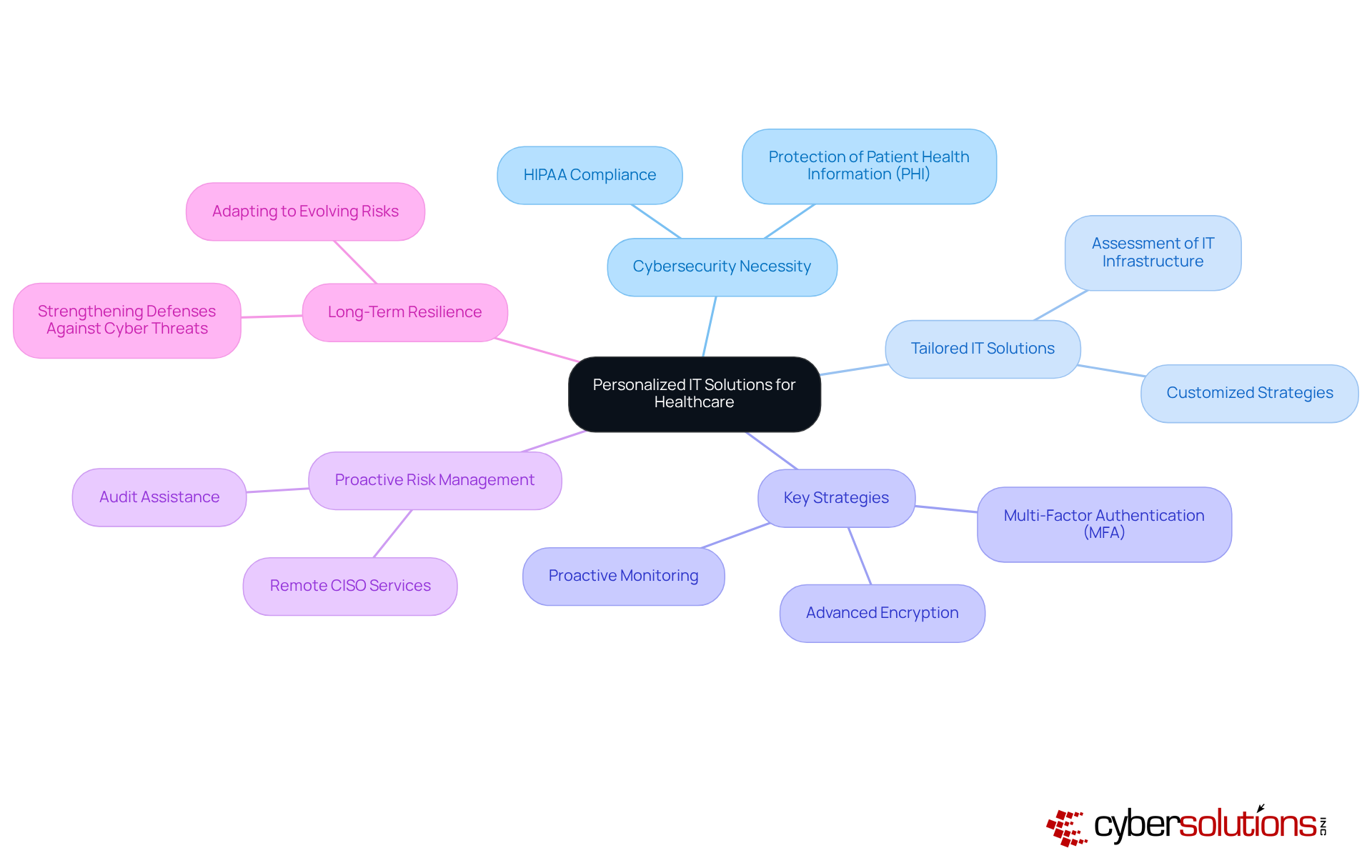
A remote CIO plays a crucial role in utilizing data analysis to foster informed decision-making within medical entities. By meticulously examining patient information, operational metrics, and market trends, they provide invaluable insights that empower leaders in the medical field to make strategic decisions. This data-driven approach not only enhances patient outcomes but also significantly improves and resource allocation, ultimately leading to more effective healthcare delivery.
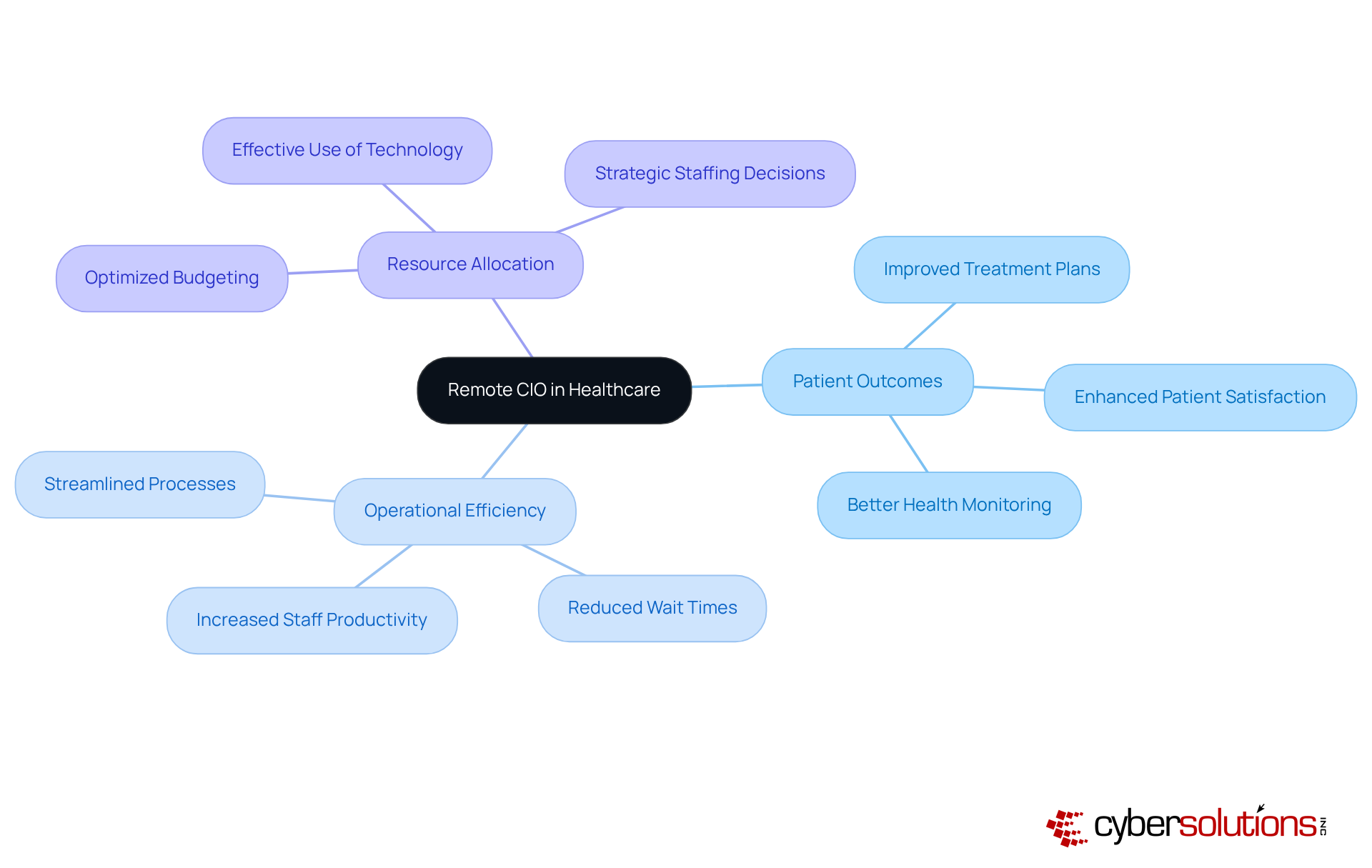
In today's healthcare landscape, the importance of cybersecurity cannot be overstated. An outsourced CIO, often referred to as a virtual chief information officer, plays a pivotal role in promoting cooperative IT leadership by seamlessly integrating with internal teams within medical organizations. By collaborating closely with existing IT staff, clinicians, and administrative leaders, they ensure that technology initiatives align with both clinical and operational goals. This collaborative approach not only enhances communication but also fosters innovation, ensuring that all stakeholders are actively engaged in the IT strategy.
Moreover, a virtual chief information officer is essential in ensuring cybersecurity compliance. They implement stringent standards to protect federal data, thereby maintaining eligibility for government contracts. Their responsibilities extend to leading initiatives for network hardening and providing staff training on recognizing suspicious emails, as well as maintaining proper cybersecurity hygiene. This proactive stance is crucial for and addressing the unique challenges faced by healthcare organizations in the face of evolving cybersecurity threats.
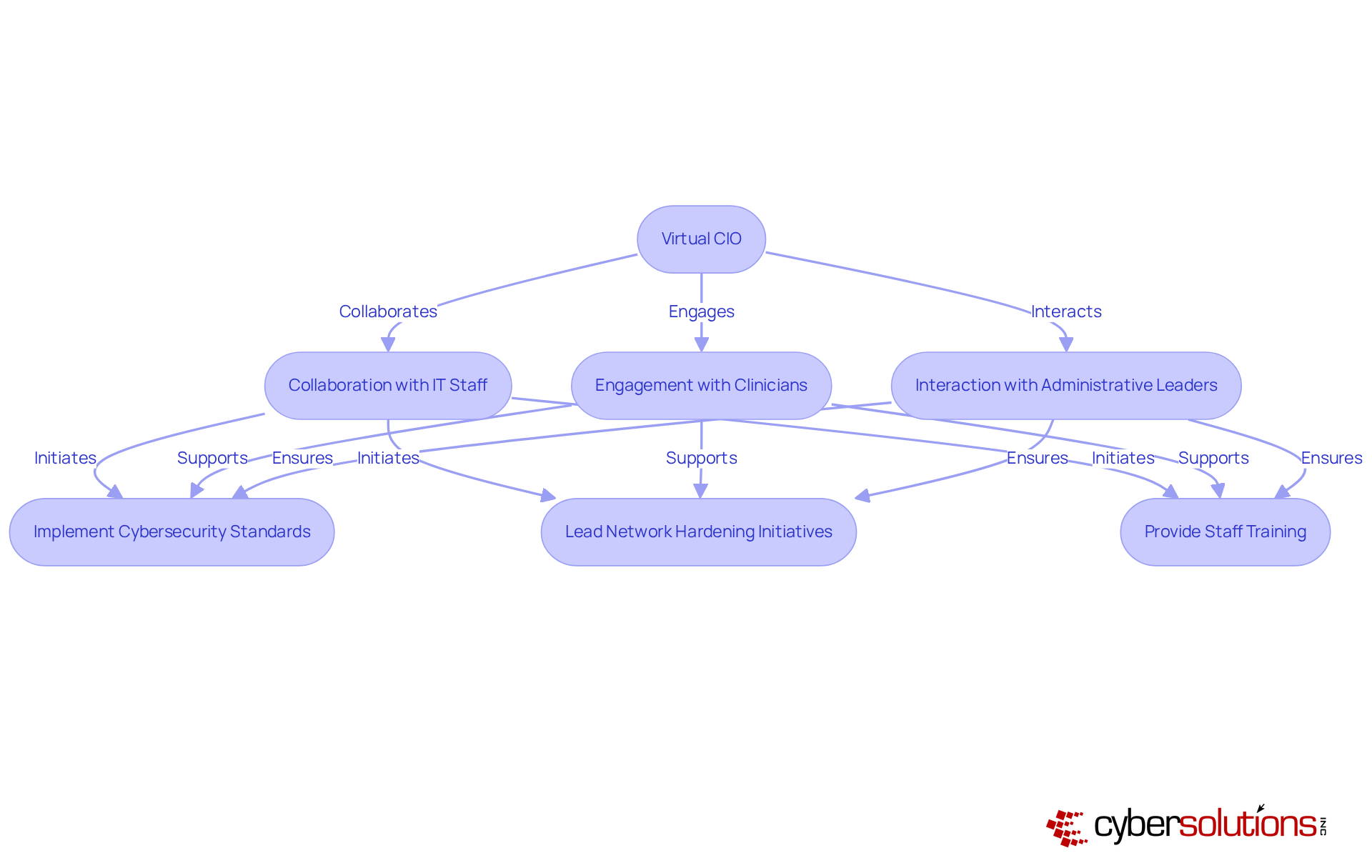
In today's healthcare landscape, the role of a Chief Information Officer (CIO) is nothing short of transformative, fundamentally shaping IT management and enhancing organizational performance. By integrating comprehensive HIPAA compliance solutions, a CIO significantly strengthens cybersecurity measures that safeguard patient health information (PHI) against unauthorized access and breaches. This proactive approach includes risk management strategies that identify and rectify vulnerabilities, ensuring that medical entities remain with legal mandates. Key components of these cybersecurity strategies encompass:
Moreover, the virtual chief information officer plays a pivotal role in optimizing budgets and operational efficiency by deploying advanced security configurations and conducting staff cyber hygiene training. This holistic strategy not only enhances patient care but also navigates the complexities inherent in the medical field. The importance of rapid incident response strategies, such as 24-hour on-site support, cannot be overstated. An incident response team prepared to act swiftly minimizes damage and facilitates quicker recovery, enabling medical organizations to maintain trust and avoid costly penalties. By offering expert guidance and aligning technology with healthcare objectives, a virtual chief information officer is essential for bolstering cybersecurity confidence and elevating overall organizational performance.
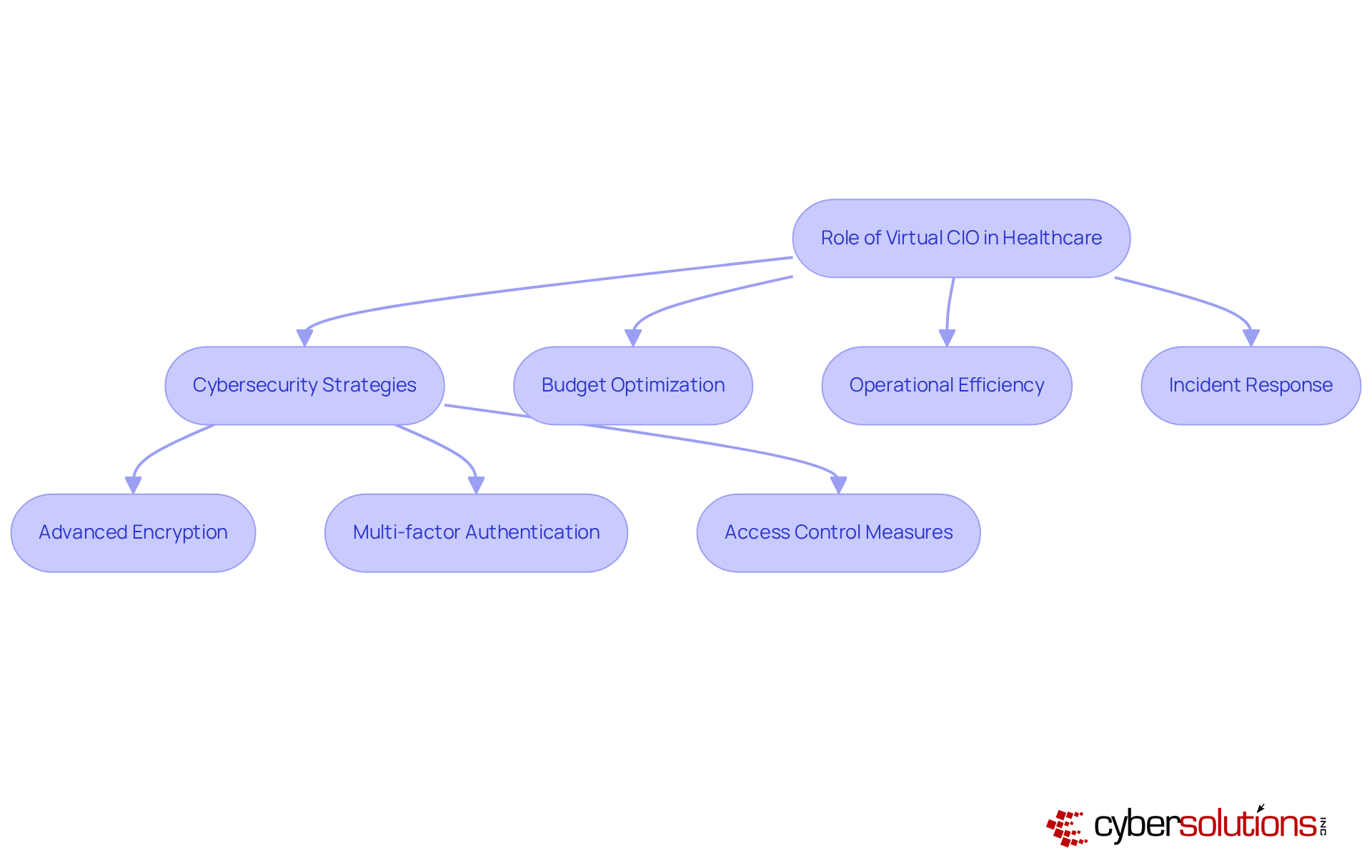
The role of a virtual chief information officer (CIO) in healthcare is not just beneficial; it is essential for enhancing efficiency and navigating the complexities of modern medical operations. In an era where cybersecurity threats loom large, a virtual CIO provides tailored IT solutions, strategic planning, and robust cybersecurity measures. This empowers healthcare organizations to concentrate on delivering quality patient care while ensuring compliance with stringent regulations.
Key insights highlight how a virtual CIO optimizes IT budgets, strengthens cybersecurity, and enhances operational efficiency:
As the healthcare landscape continues to evolve, embracing the expertise of a virtual CIO becomes increasingly essential. Organizations must assess their current IT strategies and consider the transformative impact that a virtual CIO can bring. By prioritizing tailored IT solutions and cybersecurity, healthcare providers can not only protect their operations but also elevate the overall quality of care they deliver to patients.
What services does Cyber Solutions Inc. provide for healthcare organizations?
Cyber Solutions Inc. offers tailored virtual chief information officer services that include strategic IT planning, compliance management, and cybersecurity oversight specifically designed for medical organizations.
How does Cyber Solutions help medical providers?
Cyber Solutions allows medical providers to focus on delivering quality patient care by expertly managing their IT complexities and addressing the unique regulatory and operational challenges of the healthcare sector.
Why is the role of a virtual CIO becoming more important in healthcare?
As the medical field transitions towards personalized and technology-driven models, including telehealth and AI solutions, the need for customized IT strategies to enhance operational efficiency and improve patient outcomes is increasing.
What cybersecurity measures does Cyber Solutions implement for HIPAA compliance?
Cyber Solutions integrates advanced encryption, multi-factor authentication, and stringent access control measures to protect patient health information (PHI) and ensure compliance with HIPAA regulations.
How does a virtual CIO contribute to regulatory compliance in healthcare?
A virtual CIO establishes comprehensive compliance frameworks, conducts regular audits, and implements robust cybersecurity strategies, significantly mitigating risks related to data breaches and regulatory penalties.
What benefits have medical entities experienced by adopting remote CIO services?
Medical entities utilizing remote CIO services have reported enhanced compliance postures, with some achieving up to a 50% reduction in audit expenses and efforts.
In what ways does a virtual CIO enhance cost efficiency for healthcare organizations?
A virtual CIO optimizes IT budgets through strategic planning and resource allocation, identifying excessive costs, leveraging cloud solutions, and facilitating reinvestment in patient care and technology upgrades.
What is the significance of regulatory compliance in healthcare management?
Adhering to regulations like HIPAA and GDPR is crucial for preserving patient trust and maintaining organizational integrity, making it an essential aspect of healthcare management.